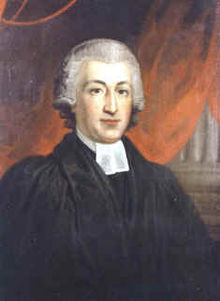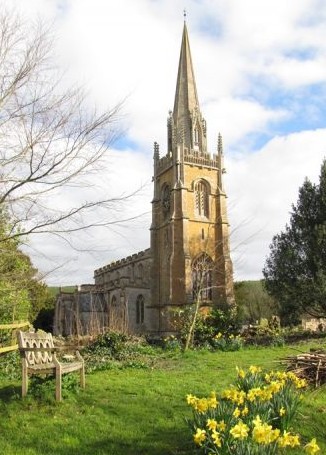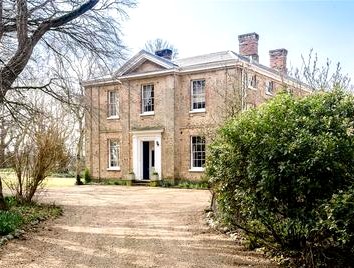|
Extracts from Parson Woodforde's Diary
A Country Parson: James Woodforde's Diary, 1759-1802,
Oxford University Press, 1985
by Alan Seymour
 According to the blurb inside the dust jacket: According to the blurb inside the dust jacket:
First published between 1924 and 1931, the diary of Parson James Woodforde (1740-1803) has been a constant source of delight and amusement to thousands of readers. This Norfolk cleric's keen wit and acute observation of English rural life in the eighteenth century make him one of our greatest diarists, to be ranked with Pepys and Evelyn.
I'm not sure I would go quite that far, but he does leave us a detailed record of the everyday lives of ordinary people in the second half of the 18th century, whilst almost ignoring such 'minor events' as the emergence of America and the French Revolution! There is perhaps less reference to church matters than one would expect from a parson, but I thought readers might be interested to read what he had to say in some entries concerning singers and galleries.
The Reverend James Woodforde, by Samuel Woodforde R.A. (1763 -1817) >>
Woodforde came from a long line of clerics, following the calling of three previous generations of 'significant priests' (so described by Ronald Blythe in the publication's Introduction). The second son of the vicar of Ansford, he was ordained Deacon on 29 May 1763 at New College, Oxford, prior to obtaining his B.A. two days later. He returned to Somerset in the autumn, becoming curate of Thurloxton in October and of Babcary the following January, before being ordained priest at Wells in September 1764. He gave up the curacy of Babcary to spend ten years as curate to his father at Castle Cary, near Wincanton, where Woodforde senior also held the living.

| While at Castle Cary, he recorded some discord between Squire Creed (the local Justice) and the Church authorities. The Squire's servant had been kept out of the gallery by the singers and the Squire wanted to have the gallery taken down. Woodforde was asked to accompany Creed to see the Bishop, but chose instead to side with his parishioners. This was a wise move in view of his diary entry for 5 November 1768:
The effigy of Justice Creed was had through the streets of C. Cary this evening upon the [Fire] Engine, and then had into the Park and burnt in a bonfire immediately before the Justice's House, for his putting the Church Wardens of Cary into Wells Court, for not presenting James Clarke for making a Riot in the Gallery at Cary Church some few Sundays back. The whole Parish are against the Justice, and they intend to assist the Church Wardens in carrying on the cause at Wells.
|
The matter was not over, however, and in February the next year he was involved in composing a law-suit between Creed and the Church Wardens, the agreement being:
... that as the Gallery at Cary Church was large enough to contain between 3 & 4 score people, and the Singers being not above 30 in number that there should be a partition made in the Gallery for the Singers, the other part being open to any body and also for Mr. Creed to pay his own costs and the Parish the other.
The temporary partition, at least, must have been installed almost immediately because Burge, a churchwarden, had annoyed the Singers 'by sending some persons into the singing part of the gallery contrary to the recent agreement’. They were promptly turned away and the Singers expressed their displeasure musically. On 26 Feb 1769, Woodforde wrote:
…The 36 psalm was sung this afternoon in Cary Church by the Singers. Done out of Pique to old Willm. Burge’.
| Psalm 36NV, vs.1:
My crafty foe, with flatt'ring art,
His wicked purpose would disguise;
But reason whispers to my heart,
He ne'er sees God before his eyes.
|
Woodforde had reason to complain again later that year and on 12 November he tells us:
I was disturbed this morning at Cary Church by the Singers. I sent my Clerk some time back to the Cary Singers, to desire that they would not sing the Responses in the Communion Service, which they complied with for several Sundays, but this morning after the first Commandment they had the Impudence to sing the Response, and therefore I spoke to them out of my Desk, to say and not sing the Responses which they did after, and at other places they sang as usual. The Singers in the Gallery were, Jon Coleman, the Baker, Jonathan Croker, Will[m] Pew Junr., Tho/sy Penny,Will[m] Ashford, Hooper the Singing Master, James Lucas, Peter, Mr. Fancis's man, Mr. Melliar's man James, Farmer Hix's son, Robert Sweete and the two young Dunfords ...
The entry for two Sundays later records:
I read Prayers and Preached this morning at C. Cary Church. N.B. No singing this morning, the Singers not being at Church, they being highly affronted with me at what I lately had done ...
The dispute continues. On December 17th he writes:
... The Singers at Cary did not please me this afternoon by singing the 12 Psalm, New Version, reflecting upon some People ...
|
Psalm 12NV, vs. 2:
One neighbour now can scarce believe
What t'other doth impart;
What flatt'ring lips they all deceive
And with a double heart.
|
But he mellows a little as Christmas approaches, recording on 24 December:
To Cary Singers this evening being Xmas Eve at Parsonage after giving them a Lecture concerning their late behaviour in Church, on promise of amendment gave 0. 2. 0. [two shillings]
All is peaceful until the summer, when on 15 July 1770:
I read Prayers and preached at Cary Church and whilst I was preaching one Tho[s] Speed of Gallhampton came into the Church quite drunk and crazy and made a noise in the Church, called the Singers a Pack of Whoresbirds and gave me a nod or two in the pulpit. The Constable Roger Coles Sen[r] took him into custody after and will have him before a Magistrate tomorrow ...
On 4 June 1771, on his father's death, he took up residence at Ansford Parsonage, continuing as Curate of Castle Cary and Ansford. In 1773, he left to take up residence at New College, Oxford, where he became Sub-Warden. In 1774 he secured his own living at Weston Longeville, near Norwich, although it was a year and a half before he took up residence there. He records his first visit to Weston thus:
16 April 1775: We breakfasted, supped and slept at Weston Parsonage. A man and his wife, by name Dunnell, live at the Parsonage House and are good kind of people. We went to Church this morning at Weston, and Cooke read Prayers and preached for Mr. Howes [his curate]. I also administered the H; Sacrament this morning at Weston Church being Easter Day -1 had near 40 Communicants. N.B. No money collected at the Sacrament, it not being usual at Weston. My Clerk is a shocking Hand. The worst singing I ever heard in a Church, only the Clerk and one man, and both intolerably bad ...
| 
Weston Old Rectory |
Woodforde makes no further reference to the singing in his church for almost 19 years, but on Christmas Day 1793 he records, unexpectedly:
... The Singers sang the Christmas Anthem and very well, between the Litany & Communion ...
After this, he resumes his silence on the subject until the diary ends in October 1802, some 11 weeks before his death on New Year's Day, 1803.
Reproduced from West Gallery no.38 (Summer 2006)
|